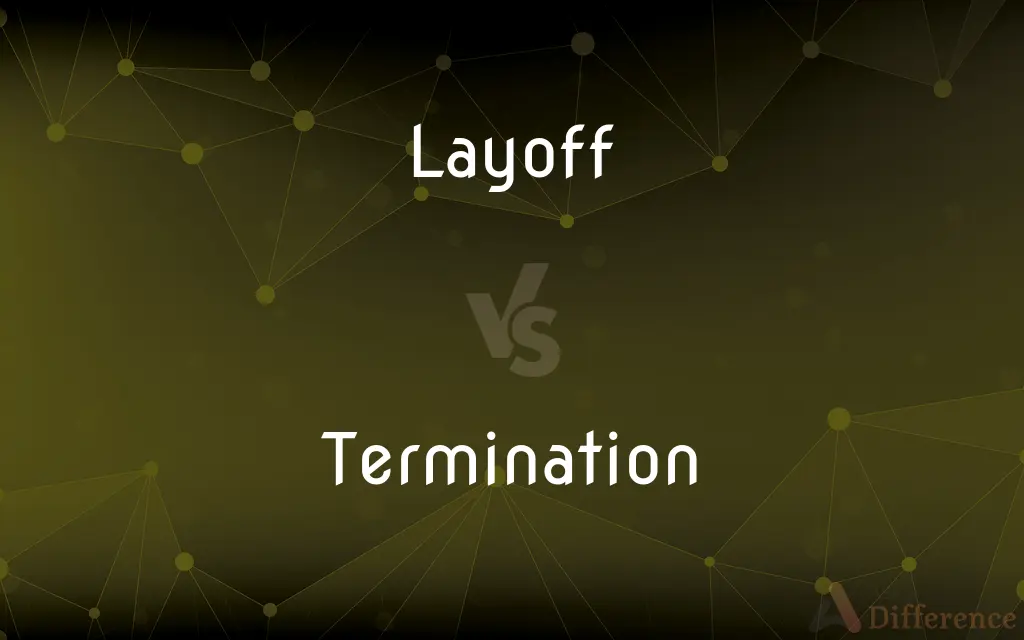Layoff vs. Termination — What's the Difference?
By Tayyaba Rehman — Updated on September 28, 2023
Layoff usually refers to temporary or permanent job loss due to a company's financial instability, while termination is the ending of employment due to employee performance or misconduct.

Difference Between Layoff and Termination
Table of Contents
ADVERTISEMENT
Key Differences
Layoff and Termination both relate to the end of employment but differ in causation, permanency, and implications. Layoff typically occurs when a company needs to reduce its workforce, commonly due to economic challenges, lack of work, or organizational restructuring. It usually implies no fault on the part of the employee and might be temporary or permanent, with the potential for rehire if conditions improve. Layoffs often involve multiple employees and can stem from a company's strategic decisions to maintain financial health.
Conversely, termination signifies the end of the employment relationship due to reasons typically associated with the individual employee, such as poor performance, violation of company policies, or other misconduct. Termination is usually permanent, reflecting a decision that the employee is not a suitable fit for the company. It is generally a singular, focused action involving the employee and employer and is often the last step in a progressive discipline process.
While a layoff might offer the possibility of future reemployment and often elicits sympathy due to its impersonal nature and economic basis, termination usually denotes a final, irrevocable end to the employment relationship, often accompanied by a negative stigma. Understanding this distinction is crucial for both employers and employees as it impacts future employment prospects, eligibility for unemployment benefits, and perceptions of professional reputation.
A nuanced understanding of layoff and termination is crucial, especially for employees navigating their career paths and employers maintaining organizational integrity. While layoffs are largely driven by organizational and economic factors and may not reflect the employee's value or performance, terminations are typically the result of individual actions or inadequacies and can significantly impact one’s career trajectory.
Comparison Chart
Causation
Economic challenges, lack of work, organizational restructuring.
Employee performance, misconduct, policy violation.
ADVERTISEMENT
Permanency
Can be temporary or permanent with potential for rehire.
Usually permanent with little to no chance of rehire.
Implications
No fault of the employee, may be eligible for rehire.
Generally employee's fault, with a negative impact on record.
Eligibility for Benefits
Often eligible for unemployment benefits.
Eligibility for benefits is usually compromised.
Impact on Reputation
Generally less damaging to professional reputation.
Typically more damaging to professional reputation.
Compare with Definitions
Layoff
A temporary or permanent discharge of an employee or employees due to economic conditions or company restructuring.
The economic downturn forced the company into a mass layoff.
Termination
Can have a negative impact on one’s professional record and future employment prospects.
The termination affected his professional reputation and job prospects.
Layoff
Generally not due to employee performance or misconduct.
The layoff was a result of budget cuts, not the workers’ performance.
Termination
It is a focused action often involving individual employees and is usually the last step in a progressive discipline process.
Despite several warnings, there was no improvement, leading to his termination.
Layoff
Often affects multiple employees and is usually economically driven.
The company announced a layoff affecting several departments due to financial instability.
Termination
Typically related to an employee’s performance, behavior, or violation of company policies.
His poor performance eventually resulted in termination.
Layoff
A separation from employment that is initiated by the employer and can be subject to recall.
After the layoff, many employees found opportunities in new industries.
Termination
The action of terminating something or the fact of being terminated
The termination of a contract
Layoff
Might offer the possibility of reemployment if conditions improve.
The layoff was temporary, with the possibility of rehiring when the market stabilizes.
Termination
A word's final syllable or letters or letter, especially when constituting an element in inflection or derivation.
Layoff
A layoff or downsizing is the temporary suspension or permanent termination of employment of an employee or, more commonly, a group of employees (collective layoff) for business reasons, such as personnel management or downsizing (reducing the size of) an organization. Originally, layoff referred exclusively to a temporary interruption in work, or employment but this has evolved to a permanent elimination of a position in both British and US English, requiring the addition of "temporary" to specify the original meaning of the word.
Termination
An ending or result of a specified kind
A good result and a happy termination
Layoff
The act of suspending or dismissing an employee, as for lack of work or because of corporate reorganization.
Termination
The act of terminating or the condition of being terminated.
Layoff
A period of temporary inactivity or rest.
Termination
The end of something in time; the conclusion.
Layoff
A dismissal of employees from their jobs because of tightened budgetary constraints or work shortage (not due to poor performance or misconduct).
Termination
An end of something in space; a limit or edge.
Layoff
A period of time when someone is unavailable for work.
Termination
A result; an outcome.
Layoff
A short pass that has been rolled in front of another player for them to kick.
Termination
(Linguistics) The end of a word, as a suffix, inflectional ending, or final morpheme.
Layoff
A bet that is laid off, i.e. placed with another bookmaker in order to reduce risk.
Termination
The process of terminating or the state of being terminated.
Layoff
The act of laying off an employee or a work force
Termination
The process of firing an employee; ending one's employment at a business for any reason.
Termination
An end in time; a conclusion.
Termination
An end in space; an edge or limit.
Termination
An outcome or result.
Termination
(grammar) The last part of a word; an ending, a desinence; a suffix.
Termination
(medical) An induced abortion.
Termination
A word, a term.
Termination
The ending up of a polypeptid chain.
Termination
The act of terminating, or of limiting or setting bounds; the act of ending or concluding; as, a voluntary termination of hostilities.
Termination
That which ends or bounds; limit in space or extent; bound; end; as, the termination of a line.
Termination
End in time or existence; as, the termination of the year, or of life; the termination of happiness.
Termination
End; conclusion; result.
Termination
Last purpose of design.
Termination
A word; a term.
Termination
The ending of a word; a final syllable or letter; the part added to a stem in inflection.
Termination
A coming to an end of a contract period;
The expiry of his driver's license
Termination
A place where something ends or is complete
Termination
Something that results;
He listened for the results on the radio
Termination
The end of a word (a suffix or inflectional ending or final morpheme);
I don't like words that have -ism as an ending
Termination
The act of ending something;
The termination of the agreement
Termination
The act of ending an employee's contract or employment relationship.
The consistent policy violations led to his termination.
Termination
Generally denotes a permanent end to employment with little to no chance of rehire.
After the termination, she had to start her job search from scratch.
Common Curiosities
Can you be rehired after a layoff?
Yes, depending on company circumstances and policies, some employees may be rehired after a layoff.
Can a termination be reversed?
Generally, termination is considered final, but specific circumstances or employer policies might allow for reversal or rehire.
Do layoffs usually imply poor performance?
No, layoffs are generally not related to employee performance but to economic conditions or organizational restructuring.
Is termination always due to negative actions by the employee?
Typically, yes, termination usually results from poor performance, misconduct, or violation of company policies.
Can termination be due to company economic conditions?
While termination is usually due to individual actions or performance, it can occasionally relate to economic conditions or restructuring when it involves ending specific roles permanently.
Does termination affect eligibility for unemployment benefits?
Yes, termination, especially for cause, often affects eligibility for unemployment benefits.
Is a layoff always the employee’s fault?
No, layoffs are typically due to organizational or economic factors and not the fault of the employee.
Are employees laid off due to economic reasons eligible for unemployment benefits?
Typically, yes, employees laid off for economic reasons are generally eligible for unemployment benefits.
Share Your Discovery

Previous Comparison
Nanoliter vs. Nanolitre
Next Comparison
Doubt vs. ClarificationAuthor Spotlight
Written by
Tayyaba RehmanTayyaba Rehman is a distinguished writer, currently serving as a primary contributor to askdifference.com. As a researcher in semantics and etymology, Tayyaba's passion for the complexity of languages and their distinctions has found a perfect home on the platform. Tayyaba delves into the intricacies of language, distinguishing between commonly confused words and phrases, thereby providing clarity for readers worldwide.














































